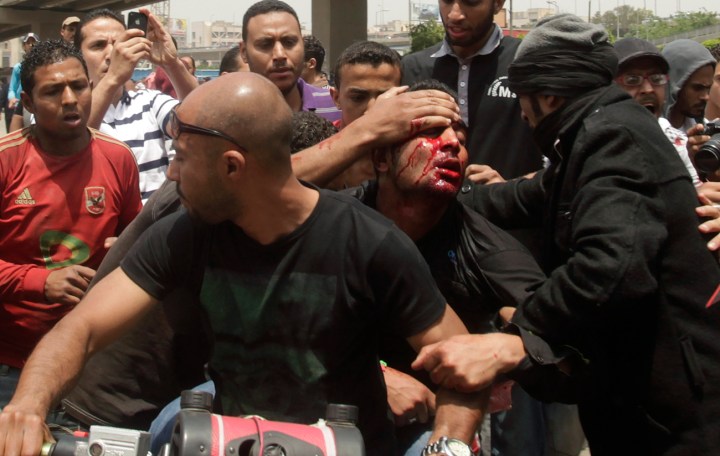It’s only the third day of campaigning in Egypt, and already 20 people are dead. But death tolls have a horrible habit of rising, as Egypt well knows after over a year of revolutionary and post-revolutionary turbulence.It’s an ominous sign that, though Hosni Mubarak is gone, his tactics have not been forgotten. The revolution still has some way to go. By SIMON ALLISON.
The victims were all claimed by the same incident. Some were shot in the head, some were stabbed, and one had his throat slit.
In Egypt, such violence used to happen behind the closed doors of police stations and intelligence torture chambers. Now it happens in the street, in broad daylight, with the cameras rolling.
The victims were part of a group of demonstrators camped outside the defence ministry in a busy Cairo suburb. They’d been there for days, along with hundreds of others, engaging in Egypt’s new favourite pastime: protesting. Their ire was directed towards Egypt’s military government.
This, despite the euphoria that greeted Hosni Mubarak’s toppling and the joyous cries of “The people and the military, one hand!” If the army played a pivotal role in his eventual resignation, the generals in charge have proved disappointingly unable to move with the democratic times, using all the old tricks from Mubarak’s playbook to shape the political landscape in their favour.
One of those tricks was to simply prevent potentially dangerous candidates from running in Egypt’s presidential elections – scheduled for later this month – on spurious technicalities. This is why the Muslim Brotherhood’s preferred candidate, Khader El-Shater, isn’t on the ballot. Nor is long-time opposition leader Ayman Nour or the ultra-religious favourite Hazem Salah Abu Ismail.
Abu Ismail’s mother owns an American passport, which is apparently grounds enough to disqualify him from this particular democratic process. Not that the US will mind too much: the prospect of an Islamic fundamentalist in charge of Egypt is too terrifying to contemplate. But the crowd outside the defence ministry – comprising mostly Abu Ismail’s supporters from the religious conservative Salafist movement – weren’t buying this pretext for a second, and had gathered to make sure the generals knew they weren’t happy.
By Wednesday, the Salafists had been joined by others eager to show their disappointment with the military government, including the Al Ahly Ultras – hardcore fans of Africa’s biggest football club who are never afraid of a scrap and have no love for the military. A small protest was beginning to morph into something bigger.
That’s when the thugs struck. Early Wednesday morning an unspecified number of unidentified men swept into the protest camp and wreaked havoc. Armed with guns and knives they launched into the protestors, who fought back as best they could, unafraid to dish out a few beatings of their own. This is the melee that claimed the 20 victims mentioned above. It also wounded nearly 200 people.
This is another of those Mubarak tricks. Before he resigned, Mubarak also sent in his thugs – policemen in plainclothes, prisoners he’d released and paid to participate, and perhaps even some genuine supporters – to deal with the tens of thousands of people calling for his downfall in Tahrir Square. The tactic failed, but for any government looking to quell unrest and maintain legitimacy it has one thing to recommend it: deniability.
So we don’t know whether the “unidentified assailants” outside the defence ministry on Wednesday were sent by the military. All the surviving protestors have are their suspicions, heightened by reports that army units stood by, watching the fighting rather than intervene.
They aren’t the only ones with suspicions. Former Nobel peace prize laureate Mohamed ElBaradei attacked the military on Twitter: “Massacre in front of the Ministry of Defence and government unable to protect civilians or in cahoots with thugs. Egypt is going down the drain,” he wrote. It is a sentiment shared by other Egyptian political figures – although not, naturally, by the military government.
In response to Wednesday’s violence, two of the leading presidential candidates suspended their campaigns, which had only begun in earnest on Monday. The Muslim Brotherhood’s Mohamed Morsi (the Brotherhood’s second choice after Shater’s dubious disqualification) won’t be giving speeches or attending rallies for two days. Neither will Abdel Moneim Aboul Fotouh, an independent Islamist candidate who is way ahead of other religious candidates in the polls.
However, his team didn’t comment on when he might resume his campaign.
As yet, there’s been no comment from the man ahead of everyone in the polls, former Arab League secretary-general Amr Moussa. In a strange and uncomfortable irony, the charismatic Moussa had the strongest links with Mubarak’s regime of all the presidential candidates, serving as his foreign minister for 10 years.
Mousa is often derided as a feluul, an insult for people with connections to the previous regime. Yet this hasn’t hindered his popularity. In fact, it may even have contributed to it, as people hanker for the stability and relative prosperity of the Mubarak days. So much for the revolution.
Still, a lot can happen in three weeks of campaigning. This race is far from complete – neither, one suspects, is that death toll. DM
Read more:
- Egypt political forces demand end to Abassiya bloodshed in Egypt’s Al Ahram.
- At least 20 killed as attackers target Cairo protest on the BBC.
Photo: Islamist protesters and their supporters help an injured protester during clashes with armed “thugs”, after an attack on protesters late Tuesday night, in Cairo on 2 May 2012. Eleven people were confirmed dead after thugs attacked the protesters demanding an end to military rule after their candidate was barred from this month’s presidential election. REUTERS/Asmaa Waguih.



















 Become an Insider
Become an Insider